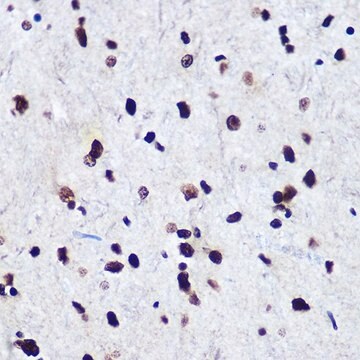350-05A
Human Coronary Artery Smooth Muscle Cells: HCASMC, adult
Synonym(s):
HCASMC cells
About This Item
Recommended Products
biological source
human coronary artery (normal, tunica intima and media)
Quality Level
packaging
pkg of 500,000 cells
manufacturer/tradename
Cell Applications, Inc
growth mode
Adherent
karyotype
2n = 46
morphology
smooth muscle
technique(s)
cell culture | mammalian: suitable
relevant disease(s)
diabetes; stroke; cardiovascular diseases
shipped in
dry ice
storage temp.
−196°C
General description
Human Coronary Artery Smooth Muscle Cells (HCASMC) provide an excellent model system to study all aspects of cardiovascular function and disease, especially those related to mechanisms of hyperplasia and hypertrophy of intimal smooth muscle cells leading to vascular occlusion in atherosclerosis and stent restenosis.
HCASMC has been utilized in a number of research studies, for example, to:
- Study signaling pathways regulating smooth muscle differentiation (Zhou, 2010); and chronic inflammation of arterial wall that leads to artherosclerosis (Kiyan, 2014)
- Demonstrate that STAT-1 and STAT-3 regulate VEGF production in smooth muscle cells by having opposing effects on HIF-1α expression (Albasanz-Puig, 2012); study the mechanisms of hypoxia and reoxigenation injuries in by demonstrating increased production of ROS and inflammatory cytokines, and further showing that DHA is not beneficial in this type of injuries (Feng, 2012)
- Investigate the gene expression differences between smooth muscle cells from different arteries, underlying their differential response to injuries and proliferation stimuli (Lange, 2013)
- Suggest the hypermethylation of SOCS3 gene as the connection between TNF-α and IGF-1 released in response to mechanical injury during coronary intervention, and the induction of cytokines leading to intimal hyperplasia and restenosis (Dhar, 2013)
- Develop a novel VEGFR/MET-targeted inhibitor with improved antitumor efficacy and decreased toxicity (Fujita, 2013); and investigate novel therapies and drug combinations to achieve optimal target selectivity (Lehar, 2009; Wo-Wong, 2013)
- Develop elastic scaffolds for tissue engineering (Nivison-Smith, 2010, 2012) and novel treatment strategies to prevent stent restenosis by designing new materials (Crowder, 2012), or drug therapies to preferentially inhibit smooth muscle cell growth (O’Neill, 2009; Mociornita, 2013)
Characterization: positive for smooth muscle cell specific alpha-actin expression.
Cell Line Origin
Application
Components
Preparation Note
- 2nd passage, >500,000 cells in Basal Medium containing 10% FBS & 10% DMSO
- Can be cultured at least 16 doublings
Subculture Routine
Disclaimer
Storage Class Code
11 - Combustible Solids
WGK
WGK 3
Flash Point(F)
Not applicable
Flash Point(C)
Not applicable
Choose from one of the most recent versions:
Certificates of Analysis (COA)
It looks like we've run into a problem, but you can still download Certificates of Analysis from our Documents section.
If you need assistance, please contact Customer Support.
Already Own This Product?
Find documentation for the products that you have recently purchased in the Document Library.
Articles
Technical information for working with human coronary artery smooth muscle cells including thawing, subculturing and cryopreservation
Our team of scientists has experience in all areas of research including Life Science, Material Science, Chemical Synthesis, Chromatography, Analytical and many others.
Contact Technical Service




